This content originally appeared on Radio Free Asia and was authored by Radio Free Asia.
This post was originally published on Radio Free.
This content originally appeared on Radio Free Asia and was authored by Radio Free Asia.
This post was originally published on Radio Free.

Aleksei Navalny’s family and close associates have confirmed the Russian opposition politician’s death in an Arctic prison and have demanded his body be handed over, but officials have refused to release it, telling his lawyers and mother that an “investigation” of the causes would only be completed next week.
“Aleksei’s lawyer and his mother have arrived at the morgue in Salekhard,” Navalny spokeswoman Kira Yarmysh wrote on X, referring to the capital of the region of Yamalo-Nenets, where Navalny’s prison is located.
“It’s closed. However, the [prison] has assured them it’s working and Navalny’s body is there. The lawyer called the phone number which was on the door. He was told he was the seventh caller today. Aleksei’s body is not in the morgue,” she added.
Yarmysh then said in a new message: “An hour ago, the lawyers were told that the check was completed and no crime had been found. They literally lie every time, drive in circles and cover their tracks.”
But in a third message, she said, “Now the Investigative Committee directly says that until the check is completed, Aleksei’s body will not be given to relatives.”
Navalny associate Ivan Zhdanov, who currently resides abroad, said that Navalny’s mother was told her son had died of a cardiac-arrest illness.
“When the lawyer and Aleksei’s mother arrived at the colony this morning, they were told that the cause of Navalny’s death was sudden death syndrome,” Zhdanov said.
Navalny’s mother, Lyudmila, who traveled to the Yamalo-Nenets region some 1,900 kilometers northeast of Moscow, was earlier informed that the Kremlin critic died at the “Arctic Wolf” prison on February 16 at 2:17 p.m. local time, according to Yarmish.
Vadim Prokhorov, a lawyer who has represented Russian human rights activists, told Current Time that “what is happening is not accidental.”
“The Russian authorities will do everything not to turn over the body in time or certainly not to conduct a forensic medical examination,” Prokhorov told Current Time, the Russian-language network led by RFE/RL in cooperation with VOA.
The penitentiary service said in a statement on February 16 that Navalny felt unwell after a walk and subsequently lost consciousness. An ambulance arrived to try to revive him but he died, the statement added.
Navalny, a longtime anti-corruption fighter and Russia’s most-prominent opposition politician for over a decade, was 47.
His death sparked an immediate outpouring of grief among many Russians, while leaders around the world condenmed the death of Vladimir Putin’s staunchest critic, blaming the Russian president directly for the death.
Group of Seven (G7) foreign ministers meeting in Munich on the sidelines of a security conference held a minute’s silence for Navalny on February 17. The G7 consists of Britain, Canada, France, Germany, Italy, Japan, and the United States.
In a joint statement released by Italy, the ministers expressed their “outrage at the death in detention of Aleksei Navalny, unjustly sentenced for legitimate political activities and his fight against corruption.”
Italian Foreign Minister Antonio Tajani said that “for his ideas and his fight for freedom and against corruption in Russia, Navalny was in fact led to his death.”
“Russia must shed light on his death and stop the unacceptable repression of political dissent,” he added.
Ukrainian President Volodymyr Zelenskiy said the death of Navalny showed that it is impossible to see Putin as a legitimate leader.
“Putin kills whoever he wants, be it an opposition leader or anyone who seems like a target to him,” Zelenskiy told the Munich Security Conference on February 17.
Yale history professor Timothy Snyder, an expert on Central and Eastern Europe, told RFE/RL in Munich that Navalny will be remembered as someone who sacrificed his life for his country.
“Putin wants to be remembered as a ruler of Russia. But Navalny will be remembered in a different way because Navalny died for his country rather than for killing other people.”
“He tried to show that other things are possible [in Russia] and we’ll never know what kind of leader he would have been,” he added.
Navalny’s vision for change in Russia will be kept alive by his team, his spokeswoman Yarmysh said. “We lost our leader, but we didn’t lose our ideas and our beliefs,” Yarmysh told Reuters via Zoom, speaking from an undisclosed location.
Navalny’s death was a “very sad day” for Russia, and must lead to international action, the wife of a former Russian agent killed by radiation poisoning said on February 17.
Marina Litvinenko, whose husband Aleksandr died of radiation poisoning in 2006, three weeks after drinking tea laced with polonium at a meeting with Russian agents at a London hotel, told AFP she had sympathy for Navalny’s wife, Yulia.
The Kremlin, which Navalny said was behind a poison attack that almost killed him in 2020, has angrily denied it played any role in Navalny’s death and rejected the “absolutely rabid” reaction of Western leaders.
Inside Russia, people continued to mourn the death of the anti-corruption crusader despite official media paying little attention to his death and efforts to remove any tributes to him.
At least 340 people have been detained in 30 cities and towns in Russia on February 16 and 17 after they came to pay tribute, include laying flowers, to the memory of Navalny, according to OVD-Info, a group that monitors political repression in Russia.
On February 17, police blocked access to a memorial in the Siberian city of Novosibirsk and detained several people there as well as in another Siberian city, Surgut, OVD-Info said.
In Moscow, people came to lay flowers at the “Wall of Sorrow” memorial on the avenue named after Soviet physicist and dissent Andrei Sakharov on February 17. Riot police immediately moved in and more than 15 people were arrested, the Sota news outlet reported.
In St. Petersburg, an Orthodox priest was detained on February 17 after he announced he would hold a memorial service for Navalny.
Grigory Mikhnov-Vaitenko was detained near his home as he was going to the Solovetsky Stone memorial dedicated to Soviet victims of political repression.
He was remanded in custody and was to be presented to a judge on February 19, the site 24liveblog.com reported.
However, a memorial service was performed by a different Orthodox priest at the site, in the presence of several people, some of whom were detained after the service was completed.
This content originally appeared on News – Radio Free Europe / Radio Liberty and was authored by News – Radio Free Europe / Radio Liberty.
This post was originally published on Radio Free.
The toll of four months of war in Gaza on journalism is “nothing short of horrifying” — Palestinian journalists killed, wounded, and prevented from working without any possibility of safe refuge, reports the Paris-based global media watchdog Reporters Without Borders (RSF).
RSF has strongly condemned the “eradication of journalism and the right to information” in Gaza by the Israeli army, and has called on states and international organisations to increase pressure on Israel to “immediately cease this carnage”.
In 124 days of conflict, at least 84 journalists have been killed in Gaza, including at least 20 in the course of their journalistic work or in connection with it, according to RSF statistics.
Journalists are being decimated as the days of this interminable war go by, through incessant Israeli strikes from the north to the south of the Gaza Strip, the watchdog said.
Journalists who had survived these four months were “living a daily hell” — in inhumane conditions, they suffered shortages of all kinds, particularly of equipment, as well as regular media blackouts, RSF said.
“In four months of conflict, Palestinian journalism has been decimated by Israeli armed forces with complete impunity, with a staggering death toll of more than 84 journalists killed — at least 20 in the line of duty,” said RSF’s Middle East desk in their statement.
“After filing two complaints with the International Criminal Court and making repeated appeals to States and international organisations, RSF is once again urging the UN Security Council to immediately enforce Resolution 2222 (2015) on the protection of journalists.
Journalists trapped in Rafah
Journalists in Gaza have no way out or any place of safe refuge. Forced to flee to the south of the enclave since October 7, the vast majority have taken refuge in Rafah, where the crossing point with Egypt is still closed and where an invasion of the city could lead to a new bloodbath.
Rafah was described by Israel as a “security zone” at the start of the conflict. Despite RSF’s calls for the Rafah gate to be opened, the Israeli authorities continue to prevent Gazan journalists from leaving and to block access to the enclave for foreign journalists.
As Gaza killings rise, so does the toll on Palestinian journalists. Video: Al Jazeera
A chilling toll
According to the Palestinian Journalists’ Syndicate (PJS), about 50 local and international media outlets in Gaza have been totally or partially destroyed by the Israeli army since October 7, in addition to the appalling death toll.
RSF filed two complaints with the Office of the Prosecutor of the International Criminal Court (ICC) on 31 October and 22 December 2023 in connection with the killings of journalists and the destruction of media outlets.
In the aftermath of the killings of independent videographer Moustafa Thuraya and Al Jazeera journalist Hamza Dahdouh on January 7, RSF obtained a decision from the ICC prosecutor to include crimes against journalists in its investigation into the situation in Palestine.
Two days later, RSF called on the UN Security Council to urgently address Israel’s violations of Resolution 2222 on the protection of journalists.
The struggle of journalists in the field
Against this terrifying backdrop, Palestinian reporters in Gaza are showing untold courage in continuing to report on the war.
Most have lost loved ones. Forced to move, they live in tents, with no electricity and very little food or water.
Wounded journalists have very limited access to medical care. In partnership with Arab Reporters for Investigative Journalism (ARIJ), RSF has been providing grants to Gazan journalists since the start of the war to support their reporting work.
Pacific Media Watch collaborates with Reporters Without Borders.

Al Jazeera rejects Israeli forces’ attempt to justify crimes against journalists
Al Jazeera Media Network has rejected the Israeli occupation forces’ attempt to justify the killing and targeting of journalists.
In a statement this week, the network has condemned the accusations against its journalists and recalled Israel’s “long record of lies and fabrication of evidence through which it seeks to hide its heinous crimes”.
The statement continued:
“At a time when its correspondents and field crews are making great sacrifices to cover what is happening in Gaza, Al Jazeera’s employment policies stipulate that employees are not to engage in any political affiliations that may affect their professionalism, and to adhere to the controls and directives contained in the Network’s code of ethics and code of conduct.
“Al Jazeera ensures that all its journalists and correspondents adhere to the editorial standards.
“The network recalls the systematic targeting of Al Jazeera by the Israeli authorities, which includes:
“Given Israel’s unprecedented campaign against journalists, Al Jazeera urges media outlets worldwide to exercise the utmost caution and responsibility when headlining Israel’s justifications for its crimes against journalists in Gaza.”
This post was originally published on Asia Pacific Report.
A West Papuan pro-independence leader has accused Indonesia of new human rights atrocities this week while the republic has apparently elected a new president with a past record of violations in Timor-Leste and West Papua.
Indonesian Defence Minister Prabowo Subianto has declared victory in the presidential election on Wednesday after unofficial vote counts showed him with a significant lead over his rivals, reports Al Jazeera.
The 72-year-old former Kopassus special forces commander, who had run unsuccessfully for president twice before, was given a dishonourable discharge in 1998 after claims that his force kidnapped and tortured political opponents of Soeharto as his regime crumbled.
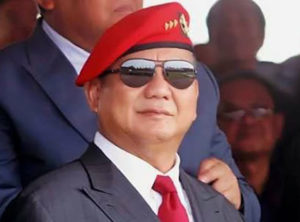
He has also been accused of human rights abuses in East Timor, which won independence from Indonesia amid the collapse of the Soeharto regime, and also in West West Papua.
On the day that Indonesia went to the polls — Valentine’s Day, February 14 — Benny Wenda, president of the United Liberation Movement for West Papua (ULMWP), accused Jakarta’s military of continuing its “reign of terror” in rural West Papua.
“The latest tragedy they have inflicted on my people occurred in the Puncak regency,” Wenda said in a statement.
“Military raids on the February 3 and 4 devastated a number of highland villages.
‘Villagers tortured, houses burnt’
“Numerous houses were burnt to the ground, villagers were tortured, and at least one Papuan died from his wounds — though Indonesian control of information makes it difficult to know whether others were also killed.”
Wenda said that “as always”, the military had claimed the victims were TPNPB resistance fighters — “a grotesque lie, immediately denied by the villagers and their relatives”.
Wenda also accused Indonesia of “hypocrisy” over Israel’s war on Gaza.
“We have complete sympathy with [Palestinians over their suffering] in what is happening in Gaza,” he said.
“But Indonesian hypocrisy on Palestine cannot be ignored. They are bringing a legal case to the International Court of Justice (ICJ) about Israel’s occupation of Palestine while intensifying their own brutal and bloody military occupation of West Papua.
“They are supporting South Africa’s genocide case against Israel at the ICJ while conducting their own genocide in West Papua.
Denying West Papuan rights
“They are crying about Palestinians’ right to self-determination while continuing to deny West Papuans that same right.”
More than 500,000 West Papuans have been killed since the occupation began in 1963, says the ULMWP.
In the past six years, more than 100,000 Papuans were estimated to have been displaced, made refugees in their own land as a result of Indonesian military operations.
“Genocide, ecocide, and ethnic cleansing — West Papuans are victims of all three. The world must pay attention to our plight.”
There were no reports of reaction from the Jakarta authorities.
This post was originally published on Asia Pacific Report.
Wednesday’s presidential election in Indonesia could see the ascendance of General Prabowo Subianto, who has tried for years to seize power after decades of involvement in mass killings, kidnapping and torture across Indonesia, in occupied East Timor and in independence-seeking Western New Guinea. Subianto is a longtime U.S. protégé and the son-in-law of former Indonesian dictator Suharto.
This post was originally published on Latest – Truthout.
With an “appalling” loss of life unfolding in Gaza, it’s essential Israel halts plans for an assault on the city of Rafah, Prime Minister Christopher Luxon says.
The government has hardened its position towards Israel’s actions in Gaza, saying air strikes on the southern city of Rafah should stop and Israel should not go ahead with any more ground operations.
At a post-Cabinet press conference yesterday, Luxon said he was extremely concerned about the 1.5 million Palestinians sheltering in Rafah right now — and that his preference was for a complete pause in hostilities.
He said Foreign Minister Winston Peters had met with Israeli ambassador Ran Yaakoby at the Beehive on Monday to pass on the government’s concerns.
The statements come as British Foreign Secretary David Cameron has also called for the fighting to stop and for a permanent sustainable ceasefire to be put in place.
New Zealand was one of 153 countries calling for the ceasefire, Luxon told RNZ Morning Report.

He said the government was extremely concerned about the loss of life for civilians as well as the threat to regional stability in the Middle East.
‘Loss of life appalling’
“The loss of life is appalling, the humanitarian situation is deteriorating, the cost of the conflict frankly is far too high.
“We want to see a pause in hostilities and that’s why we’ve said we don’t want Israel to proceed with an assault on Rafah.”
He said it was crucial to invoke the Middle East peace process which would take action from both sides — Hamas to release the remaining hostages and stop its rocket fire on Israel while the latter would need to cease its military operations and allow increased humanitarian aid for Gaza.
“What you’re hearing overnight is a concerted position from countries all around the world saying: look, we need an immediate humanitarian ceasefire. That needs to be the pathway to the permanent sustainable ceasefire we all want to see happen.”
Israel had a massive duty to protect civilians in Gaza and consider the long-term impact of its actions on the Middle East.
“That’s why we just don’t think going into Rafah, proceeding with operations there is a way forward. We want Israel to stop and think about the consequences and getting a long-term solution in place to actually get to peace.”
New Zealand had also continued to contribute humanitarian support with another $5 million donation to the International Red Cross and the World Food Programme.
This article is republished under a community partnership agreement with RNZ.
This post was originally published on Asia Pacific Report.
The party of jailed former Pakistani Prime Minister Imran Khan, which according to still incomplete results has won most mandates in the February 8 elections, said it was ready to form a government amid warnings by the nuclear-armed country’s powerful military that politicians should put the people’s interests above their own.
The Election Commission of Pakistan (ECP) has so far announced the winners of 253 of the 265 contested parliamentary seats amid a slow counting process hampered by the interruption of mobile service.
According to those results, independents backed by Khan’s Pakistan Tehrik-e Insaf (PTI) won 92 seats, while former Prime Minister Nawaz Sharif’s Pakistan Muslim League Nawaz (PML-N) garnered 71, and the Pakistan People’s Party (PPP) obtained 54 mandates. The remainder are spread among other small parties and candidates.
Both Khan and Sharif declared victory.
As results appeared to point to a hung parliament, PTI’s acting Chairman Gohar Ali Khan on February 10 told a news conference in Islamabad that the party aimed at forming a government as candidates backed by it had won the most seats.
Khan also announced that if complete results were not released by February 10 in the evening, the PTI intended to stage a peaceful protest on February 11.
Third-placed PPP, led by Bilawal Bhutto Zardari, a former foreign minister who is the son of assassinated former Prime Minister Benazir Bhutto, could play kingmaker in case of talks to form a coalition government.
Sharif said on February 9 that he was sending his younger brother and former Prime Minister Shehbaz Sharif as an envoy to approach the PPP and other political parties for coalition talks.
The elections were held in a highly polarized environment as Khan, a former cricket superstar, and his party were kept out of the election. Khan is currently in prison after he was convicted of graft and leaking state secrets. He also saw his marriage annulled by a court.
Earlier on February 10, the chief of Pakistan’s powerful military urged the country’s political class to set aside rivalries and work for the good of the people.
“The nation needs stable hands and a healing touch to move on from the politics of anarchy and polarization, which does not suit a progressive country of 250 million people,” General Syed Asim Munir said in a statement.
“Political leadership and their workers should rise above self-interests and synergize efforts in governing and serving the people, which is perhaps the only way to make democracy functional and purposeful,” Munir said.
The military has run Pakistan for nearly half its history since partition from India in 1947 and it still wields huge power and influence.
The February 8 vote took place amid rising political tensions and an upsurge of violence that prompted authorities to deploy more than 650,000 army, paramilitary, and police personnel across the country.
Despite the beefed-up security presence, violence continued even after the election. On February 10, the leader of Pakistan’s National Democratic Movement, Mohsin Dawar, was shot and wounded in Pakistan’s North Waziristan tribal district.
Daward was shot and injured as he addressed supporters in front of a military camp in Miramsha in the country’s northwest.
Dawar, a well-known Pashtun politician, was shot in the thigh and rushed to a nearby hospital in stable condition. He was later transported to the capital, Islamabad, for further treatment. His injuries are not life threatening. Videos of a bloodied Dawar circulated on social media
Three supporters were killed and 15 more injured in the incident, Rahim Dawar, a party member and eyewitness who is of no relation to the Pashtun politician, told RFE/RL.
Dawar, who was running for the lower house of parliament, arrived at the headquarters of the regional election committee, located inside the military camp, to demand officials announce the result of the vote.
Soldiers barred Dawar from entering and he was later shot as he addressed supporters outside the office. Dawar’s supporters accuse the police and security forces of firing at them.
The security forces have yet to respond to the allegation. Local media, citing unidentified security sources, reported that some policemen were also killed in the incident, but RFE/RL could not confirm that.
Dawar won a five-year term in 2018 and served in parliament until it was dissolved. Election officials later in the day said Dawar had lost the election.
Crisis-hit Pakistan has been struggling with runaway inflation while Islamabad scrambles to repay more than $130 billion in foreign debt.
Reported irregularities during the February 8 poll prompted the United States, Britain, and the European Union to voice concerns about the way the vote was conducted and to urge an investigation.
Pakistan’s Foreign Ministry on February 10 rejected the criticism.
PTI was banned from participating in the vote because the ECP said it had failed to properly register as a party. Its candidates then decided to run as independents after the Supreme Court and the ECP said they couldn’t use the party symbol — a cricket bat. Parties in the country use symbols to help illiterate voters find them on the ballots.
Yet the PTI-backed independents have emerged as the largest block in the new parliament. Under Pakistani law, they must join a political party within 72 hours after their election victory is officially confirmed. They can join the PTI if it takes the required administrative steps to be cleared and approved as a party by the ECP.
Khan, 71, was prime minister from 2018 to 2022. He still enjoys huge popularity, but his political future and return to the political limelight is unclear.
This content originally appeared on News – Radio Free Europe / Radio Liberty and was authored by News – Radio Free Europe / Radio Liberty.
This post was originally published on Radio Free.

The party of jailed former Pakistani Prime Minister Imran Khan, which according to still incomplete results has won most mandates in the February 8 elections, said it was ready to form a government amid warnings by the nuclear-armed country’s powerful military that politicians should put the people’s interests above their own.
The Election Commission of Pakistan (ECP) has so far announced the winners of 253 of the 265 contested parliamentary seats amid a slow counting process hampered by the interruption of mobile service.
According to those results, independents backed by Khan’s Pakistan Tehrik-e Insaf (PTI) won 92 seats, while former Prime Minister Nawaz Sharif’s Pakistan Muslim League Nawaz (PML-N) garnered 71, and the Pakistan People’s Party (PPP) obtained 54 mandates. The remainder are spread among other small parties and candidates.
Both Khan and Sharif declared victory.
As results appeared to point to a hung parliament, PTI’s acting Chairman Gohar Ali Khan on February 10 told a news conference in Islamabad that the party aimed at forming a government as candidates backed by it had won the most seats.
Khan also announced that if complete results were not released by February 10 in the evening, the PTI intended to stage a peaceful protest on February 11.
Third-placed PPP, led by Bilawal Bhutto Zardari, a former foreign minister who is the son of assassinated former Prime Minister Benazir Bhutto, could play kingmaker in case of talks to form a coalition government.
Sharif said on February 9 that he was sending his younger brother and former Prime Minister Shehbaz Sharif as an envoy to approach the PPP and other political parties for coalition talks.
The elections were held in a highly polarized environment as Khan, a former cricket superstar, and his party were kept out of the election. Khan is currently in prison after he was convicted of graft and leaking state secrets. He also saw his marriage annulled by a court.
Earlier on February 10, the chief of Pakistan’s powerful military urged the country’s political class to set aside rivalries and work for the good of the people.
“The nation needs stable hands and a healing touch to move on from the politics of anarchy and polarization, which does not suit a progressive country of 250 million people,” General Syed Asim Munir said in a statement.
“Political leadership and their workers should rise above self-interests and synergize efforts in governing and serving the people, which is perhaps the only way to make democracy functional and purposeful,” Munir said.
The military has run Pakistan for nearly half its history since partition from India in 1947 and it still wields huge power and influence.
The February 8 vote took place amid rising political tensions and an upsurge of violence that prompted authorities to deploy more than 650,000 army, paramilitary, and police personnel across the country.
Despite the beefed-up security presence, violence continued even after the election. On February 10, Pashtun candidate Mohsen Dawar
was shot and wounded in Pakistan’s North Waziristan tribal district.
Crisis-hit Pakistan has been struggling with runaway inflation while Islamabad scrambles to repay more than $130 billion in foreign debt.
Reported irregularities during the February 8 poll prompted the United States, Britain, and the European Union to voice concerns about the way the vote was conducted and to urge an investigation.
Pakistan’s Foreign Ministry on February 10 rejected the criticism.
PTI was banned from participating in the vote because the ECP said it had failed to properly register as a party. Its candidates then decided to run as independents after the Supreme Court and the ECP said they couldn’t use the party symbol — a cricket bat. Parties in the country use symbols to help illiterate voters find them on the ballots.
Yet the PTI-backed independents have emerged as the largest block in the new parliament. Under Pakistani law, they must join a political party within 72 hours after their election victory is officially confirmed. They can join the PTI if it takes the required administrative steps to be cleared and approved as a party by the ECP.
Khan, 71, was prime minister from 2018 to 2022. He still enjoys huge popularity, but his political future and return to the political limelight is unclear.
This content originally appeared on News – Radio Free Europe / Radio Liberty and was authored by News – Radio Free Europe / Radio Liberty.
This post was originally published on Radio Free.
Comprehensive coverage of the day’s news with a focus on war and peace; social, environmental and economic justice.
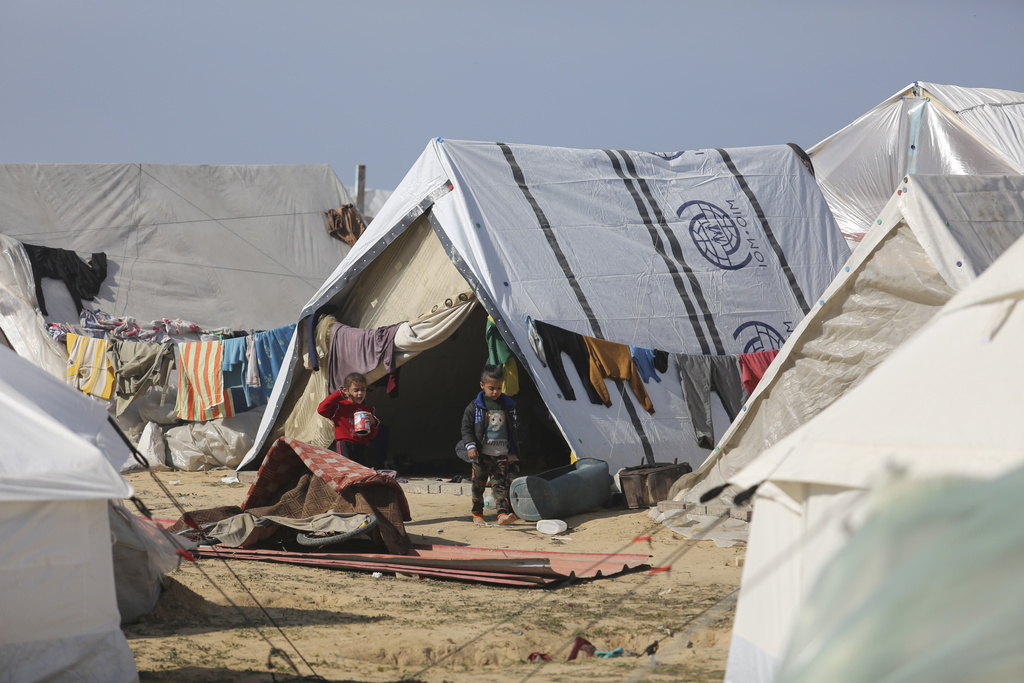
Palestinian children displaced by Israeli air and ground offensive on the Gaza Strip walk through a temporary tent camp near Kerem Shalom crossing in Rafah, Sunday, Jan. 14, 2024. (AP Photo/Hatem Ali)
The post Israeli military to prepare a plan to evacuate civilians from Gaza city of Rafah ahead of an expected Israeli invasion – February 9, 2024 appeared first on KPFA.
This content originally appeared on KPFA – The Pacifica Evening News, Weekdays and was authored by KPFA.
This post was originally published on Radio Free.
This content originally appeared on Radio Free Europe/Radio Liberty and was authored by Radio Free Europe/Radio Liberty.
This post was originally published on Radio Free.
A pro-independence militant West Papuan group says it will release a New Zealand pilot it has held hostage for a year via the United Nations, reports Reuters.
It was unclear when the 38-year-old pilot, Philip Mehrtens, who was kidnapped exactly a year ago yesterday when he landed a small commercial plane in a rugged mountainous area, would be released.
Terianus Satto of the West Papua National Liberation Army (TPNPB), one of several groups fighting for Papua’s independence from Indonesia, said in a statement that Mehrtens would be released to “protect humanity and . . . human rights”.
“TPNPB will return the pilot Philip Max Martherns [sic] to his family through the jurisdiction of the Secretary-General of the United Nations,” he said.
A spokesperson for Foreign Minister Winston Peters said: “New Zealand continues to work with all parties on securing Mr Mehrtens’ safe release. The Minister of Foreign Affairs has no further comment at this time.”
A low-level but increasingly deadly struggle for independence has been waged in the resource-rich western half of the island of Papua since it was brought under Indonesian control in a vote overseen by the United Nations in 1969 but rejected as flawed by most West Papuans.
Papuans are indigenous Melanesians like their neigbouring islanders in the independent state of Papua New Guinea.
Negotiations over pilot
Indonesia’s government and military, which have struggled against the pro-independence movement, have said they were in negotiations to free the pilot.
However, Asia Pacific Report says West Papuan activists are wary of negotiations with Indonesian authorities.
A statement last week by another faction seeking independence, the government of the “Federal Republic of West Papua”, declared that Indonesian authorities had been resisting diplomatic moves to free the pilot and negotiations had reached a “stalemate”.
The statement signed by the self-styled president Yoab Syatfle said: “The people of West Papua are of Pacific race and have closer affinity and share common customs and traditions with the people of Papua New Guinea, Solomon Islands, Vanuatu, Fiji, New Caledonia, Australia, Cook Islands, Federal States of Micronesia, Kiribati, Nauru, New Zealand, Niue, Palau, Republic of Marshall Islands, Samoa, Tonga and Tuvalu.”
Seeking negotiations for an independent future for West Papua, Syatfle said that since Mehrtens had been kidnapped, “60 innocent people had been killed, Indonesia had banned and closed access from air and land, closed 14 districts, closed 33 villages, and closed 39 churches [in the Nduga Regency].”
Indigenous people had had to move to other safe places and the Indonesian military controlled everything, the statement said.
“The Indonesian military never reached the location of the kidnappers [in a year] because it was a Papuan stronghold and because of the challenges of the mountains.”
This article is republished under a community partnership agreement with RNZ.
This post was originally published on Asia Pacific Report.
Since Myanmar’s coup three years ago, anti-junta forces claim to have shot down at least seven military fighter jets and helicopters – three in January alone – a serious blow to the military increasingly relying on its advantage in the air against underequipped rebel groups making gains on the ground.
Radio Free Asia was unable to verify the shoot-downs, which rebels groups say were achieved mostly through small-arms fire. The military has said nothing about them.
Nearly all the incidents occurred within the past year, and three since the start of the year.
In the latest, on Jan. 29, a Eurocopter AS 365 Dauphin transport helicopter crashed in Kayin state’s Myawaddy township. Joint forces of the ethnic Karen National Liberation Army, or KNLA, and the Cobra People’s Defense Force, or PDF – ordinary citizens who have taken up arms – claimed responsibility for bringing it down.
On Jan. 3, the ethnic Kachin Independence Army, or KIA, claimed to have shot down a Mi-17 transport helicopter over Kachin state’s Waingmaw township, as well as a FTC 2000G fighter jet over northern Shan state on Jan. 16.
The military has become wary after losing fighter jets and combat helicopters in recent months, said KIA information officer Col. Naw Bu, and is now exclusively using transport helicopters “capable of carrying hundreds of bombs” in its attacks on rebel forces.
“But they cannot use helicopters everywhere,” he said. “That’s why … they are experiencing difficulties.”
A former army officer, who spoke on condition of anonymity due to security concerns, said that while anti-junta forces do not possess surface-to-air missiles and other sophisticated equipment, they are still capable of shooting down the junta’s low-flying aircraft with weapons such as .50 caliber machine guns.
“Speaking of the plane that went down recently, the ground commander couldn’t clear [anti-junta forces from] the ground, so the aircraft may have been shot down by snipers,” he said.
The officer noted that the United States military lost more than 2,200 aircraft during flights over Vietnam, Laos and Cambodia during the Vietnam War, including more than 1,700 to hostile action and more than 500 in accidents, despite having a significant advantage in the air over its enemies.
“Such things happen,” he said. “It can be said that these are common incidents.”
Pivot to the air
The junta, which ousted the democratically elected government in a Feb. 1, 2021 coup d’etat, has deployed fighter aircraft and artillery attacks in the ensuing civil war with devastating effect, in many cases causing civilian deaths and widespread destruction.
And as the rebel groups have seized more ground in recent months, junta commanders have increasingly turned to air attacks, opposition groups and military experts say.
During the first year of the coup, 109 civilians were killed and 177 were injured by airstrikes and artillery attacks. During the second year, civilian casualties jumped almost four times to 328 killed and 768 injured. The most recent year – between Feb. 1, 2023, and Jan. 31, 2024 – 992 people were killed and 1,696 were injured, according to data compiled by RFA.
U.N. High Commissioner for Human Rights Volker Turk warned earlier this week that human rights abuses in Myanmar had “deteriorated even further” in recent months as the military has grown desperate amid a series of battlefield defeats, and called for sanctions to limit the junta’s access to weapons, jet fuel, and foreign currency.

The first time rebels say they shot down a junta aircraft was in May 2021, just months after the coup, when the KIA claimed responsibility for taking out an Mi-35 attack helicopter that crashed in Kachin state’s Momauk township.
It would be nearly two years until the next crash, when a PDF paramilitary group in Sagaing region’s Homalin township claimed to have shot down a Russian-made Mi-17 transport helicopter on Feb. 3, 2023.
In June that year, the Karenni National People’s Liberation Front, or KNPLF, said it shot down a K-8W light attack fighter jet over Kayah state’s Bawlake township. Ethnic Karenni combined forces said they downed another K-8 fighter jet on Nov. 11 and were able to locate the crash site.
‘Generals’ blood run cold’
As the war drags into the fourth year, the military will lose more aircraft, predicted Capt. Ze Thu Aung, who left Myanmar’s Air Force to advise anti-junta groups as part of the Civil Disobedience Movement.
“Every resistance group now has an understanding of how to weaken the junta’s airstrikes,” he said. “At the moment, everyone is already preparing for them. That’s why the rate of military aircraft crashes has increased in 2023 and 2024.”
Than Soe Naing, a political commentator, said he believes that if more aircraft are destroyed, the military will lose its biggest asset, leading to “a turning point in protecting the lives of the people.”

More importantly, commentator Kyee Myint said, if the military’s aircraft is shown to be susceptible to attack, it would mark a significant blow to the junta’s tactical advantage over the armed resistance.
“It would make the generals’ blood run cold,” he said. “Then, the resistance would no longer need to look up in fear.”
Kawlin under attack
The latest crash came amid a fierce push by junta forces to retake Kawlin, in the northern Sagaing region, since the start of the month, with a combined force of some 800 soldiers supported by airstrikes, shelling and drone attacks.
Residents said that the military had recently dropped a column of reinforcements by aircraft to assist in its fight for the town – a rice-producing area of economic and strategic significance to northern Sagaing.
“Everyone is afraid of both the ground troops and aerial attacks,” said one resident who declined to be named, citing fear of reprisal.
Nearly 50,000 residents of Kawlin have fled the town since Feb. 1, after receiving reports of advancing troops and possible airstrikes, he said.
Translated by Htin Aung Kyaw and Aung Naing. Edited by Joshua Lipes and Malcolm Foster.
This content originally appeared on Radio Free Asia and was authored by By RFA Burmese.
This post was originally published on Radio Free.
An activist organisation is accusing the Aotearoa New Zealand police of brutality after arrests were made at a pro-Palestine protest in Lyttelton today.
About 60 people took part in the protest at Lyttelton Port this morning, and police said four people were arrested about 1pm after blocking traffic.
Protesters had blocked a tunnel and poured a liquid onto the road, a police spokesperson said.
Charges were being considered.
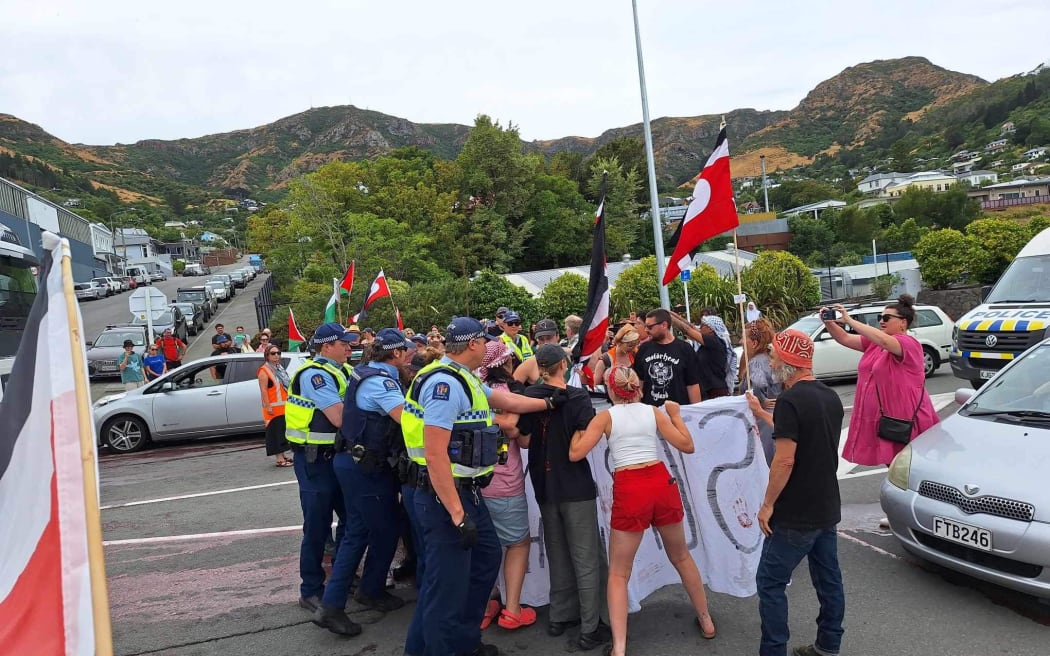
Palestine Solidarity Network Aotearoa (PSNA) secretary Neil Scott issued a statement saying members were “repulsed” by police actions at the protest, which he labelled “disgusting”.
“The police arrested seven people and pepper sprayed many, including senior citizens protesting peacefully,” Scott said.
Scott said the group was 17 weeks into protests calling for a ceasefire in Israel’s war on Gaza and for the government to condemn the violations since last month’s International Court of Justice (ICJ) ruling.
Police ‘aggression’ increased
Police “aggression” toward the protest activities had been increasing during that time, Scott said, and the group wanted an investigation into officers’ actions at the latest protest.
Protest organiser Ihorangi Reweti-Peters told RNZ that police used “brute force” to stop protesters from blocking the road.
“Police were sort of rarking people up and saying, ‘come on then’, and ‘do it’.”
“Everyone was sprayed — pepper sprayed — and then the people were arrested.”
Three of those arrested had been released by early this evening, Reweti-Peters said.
Police have been contacted for comment.
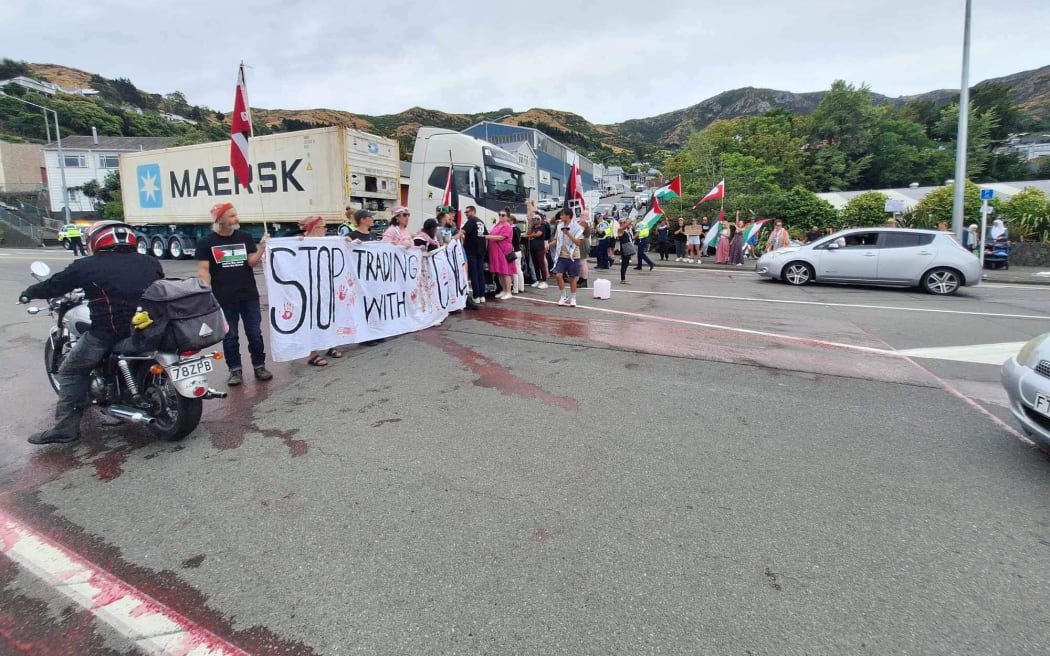
This post was originally published on Asia Pacific Report.
By Eleisha Foon RNZ Pacific journalist
The Republic of Fiji Military Forces (RFMF) “stands by” one of its senior officers, who is taking on a role with the Australian Army, despite the officer being accused of committing human rights abuses.
The Australian first reported that Colonel Penioni (Ben) Naliva had been appointed as deputy commander of the Australian Army’s 7th Brigade, making him second in command of about 3500 Australian troops.
However, the right-hand man to former Fiji coup leader and prime minister Voreqe Bainimarama, according to the newspaper, is alleged to have been involved in the violent beatings of two Fijian politicians in 2006.
“In another case, the UN Special Rapporteur named then-major Naliva, in a report to the Human Rights Council, as being involved in the savage beating of a Suva businessman that left him unable to walk,” according to The Australian’s frontpage report published today.
“In a third case, a prominent youth activist says Naliva was present when he was detained and tortured in 2006, and did nothing to stop it.”
Rejected accusations
But RFMF Military Assistant to Chief of Defence Lieutenant-Colonel Eroni Duaibe has rejected the accusations labelled against Colonel Naliva.
He told RNZ Pacific most of the allegations had “come about through social media platforms” posted by “disgruntled individuals”.
“There has not been any formal reports that have been lodged with Fiji police in regards to this,” Lieutenant-Colonel Duaibe said.
“We stand by Colonel Naliva and his appointment with the Australian defence.”
According to The Australian, following inquiries about the accusations, “[Australian] Defence is understood to be working with the Fijian government to determine ‘appropriate next steps’”.
“Defence is aware of reporting regarding Colonel Penioni Naliva. Defence takes any allegations of wrongdoing seriously,” it reported.
“Colonel Naliva has not been charged over any of the allegations and The Australian is not suggesting they are true, only that they have been made and are now the subject of inquiry by the Australian government.”
Committed on defence
RNZ Pacific has contact the Australian Defence, United Nations Special Rapporteur on Human Rights and Fijian Human Rights and Anti Discrimination Commission for comment.
Australia has committed to grow its defence and security cooperation with Fiji — under the Vuvale Partnership agreement signed last October, with increasing co-deployments.
The appointment comes after Colonel Naliva graduated from the Australian War College last year.
Independent Senator Jacqui Lambie has also called on the Australian government to explain who appointed Colonel Naliva to the role when he is facing such allegations.
This article is republished under a community partnership agreement with RNZ.
This post was originally published on Asia Pacific Report.
Aotearoa New Zealand must ramp up pressure on Israel to abide by last month’s International Court of Justice ruling, writes John Minto.
COMMENTARY: By John Minto
In 2003, the International Court of Justice ruled that Israel’s “apartheid wall” being built through Palestinian territory was a violation of international law and should be dismantled. Israel ignored the ruling and more than 20 years later the wall remains a potent symbol of Israeli policies of segregation based on ethnicity.
Last December, Israel was taken to the court again, this time by South Africa which argued Israel was committing genocide against the Palestinian people in Gaza with genocidal talk from Israeli leaders and indiscriminate killing of civilians — more than 27,000 killed so far including more than 12,000 Palestinian children.
The charge of genocide against Israel will take years to be heard and decided upon but in the meantime South Africa argued for the court to issue interim orders to require Israel to end its military operation and allow desperately needed humanitarian assistance to flow freely into Gaza.
Last month, the ICJ gave an interim ruling and although it did not demand an immediate ceasefire, it agreed with South Africa’s case that there was evidence to suggest Israel had breached the Genocide Convention and requiring Israel to report back to the court within a month on the steps it was taking to protect Palestinian lives and their very existence in Gaza.
Israel is now on probation. What happens in the coming weeks will determine whether Israel ends its killing spree in Gaza or shows the ICJ its middle finger as it did in 2003.
Commentary on the ICJ decision indicates the huge moral weight the decision carries for Israel and its small coterie of supporters, including New Zealand, which has been complicit through its silence, to end the war on Gaza.
The only way Israel will follow the ICJ ruling is if it comes under enough pressure from countries such as New Zealand.
Strong demand or look away?
Western countries have previously called on other countries to abide by ICJ rulings — such as the ruling which said Russia must end its war in Ukraine. Will we make the same strong demand of Israel or will we look the other way?
So far New Zealand has been equivocal, Foreign Minister Winston Peters making a few obligatory tweets but nothing more. The contrast with how we dealt with Russia compared with Israel could not be clearer.
The Foreign Minister’s stance seems more aimed to avoid difficult conversations with US representatives at diplomatic cocktail parties than pressure to end the killing of Palestinian children.
With Israel’s history of ignoring international law, New Zealand must speak out in a principled, assertive way. The alternative is to be silent and for this country to suffer derision for such cowardly, obsequious behaviour.
Already New Zealand is swimming against the tide of world opinion. We have refused to criticise the killing of Palestinian civilians by Israel despite loudly condemning the killing of Israeli civilians in the October 7 attack.
We have also refused to condemn other war crimes such as the “collective punishment” of Palestinians through the withholding of food, water and other necessities of life. We haven’t even made an unequivocal call for an immediate, permanent ceasefire or called for an International Criminal Court investigation into war crimes on and after October 7.
We did this for Russia’s invasion of Ukraine, so why the reticence over the Middle East?
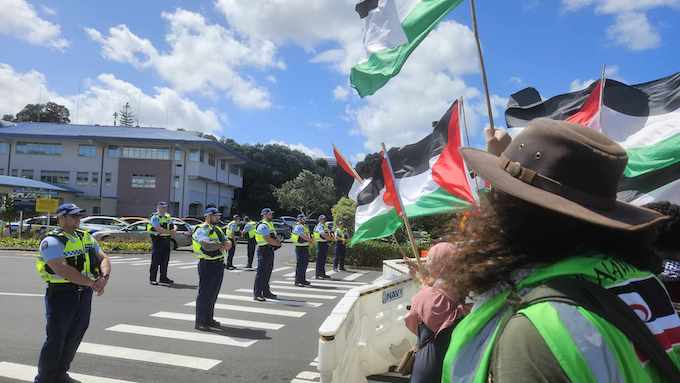
NZ’s selective morality
Our embarrassing history is one of selective morality. In 2014 when Israel launched a war on Gaza with similar mass killing of Palestinians, the John Key government called in the Israeli ambassador and made clear New Zealand’s expectations. The Christopher Luxon-led government has failed to take even this most rudimentary measure.
The time for doing that is well past. We must indicate to Israel that its behaviour is morally and ethically reprehensible.
The government should immediately close the Israeli embassy until Israel is in full compliance with the ICJ decision as well as the broader provisions of international law such as allowing Palestinian refugees the right to return to their land and homes in Palestine, ending the military occupation and ending Israel’s apartheid policies against Palestinians.
Wringing our hands is not an option. It might be acceptable for the comfort of the Minister of Foreign Affairs but for Palestinians it means ongoing death and destruction.
John Minto is the national chairman of Palestine Solidarity Network Aotearoa (PSNA) and contributes to Asia Pacific Report. This article was first published by the Otago Daily Times and is republished with the author’s permission.
This post was originally published on Asia Pacific Report.
The United States will stage annual, large-scale military drills in Thailand at the end of February, the allied nations announced Friday, with more than 10,000 troops from 30 nations slated to participate.
As part of the maneuvers, the U.S. and Thai navies will salvage a U.S.-made corvette that sank in the Gulf of Thailand in December 2022, leaving 34 crewmen dead or unaccounted for.
The Cobra Gold war games will be held Feb. 27 to March 10 – the 43rd iteration of the world’s longest-running international military training program and one of the Indo-Pacific region’s largest combined military exercises.
Troops from the seven main participants – the U.S., Thailand, Malaysia, Singapore, Indonesia, South Korea and Japan – will join combat rehearsals at five locations, including amphibious landings, strategic parachute jumps, ground and air live-fire and cyber warfare.
China will not take part in combat drills but will join civic action missions with India.

The exercises follow a late January high-level meeting in Bangkok between U.S. National Security Adviser Jake Sullivan and China’s Foreign Minister Wang Yi.
That meeting was aimed at lessening tensions on the Taiwan issue and in the South China Sea.
Light salvage operation
Thailand and the United States will work together on the light salvage of the HTMS Sukhothai, which capsized and sank off Prachuap Khiri Khan province in stormy seas, officials from the two host countries said Friday.
Twenty-nine died while five crewmen remain undiscovered, according to the Royal Thai Navy.
“This salvage, which will be executed as part of Cobra Gold 2024, will hopefully bring some comfort and closure to the families of all the brave sailors and marines who were lost,” U.S. ambassador Robert F. Godec, told a joint news conference at a Thai military headquarters on Friday.
The chief of Royal Thai Navy, meanwhile, denied local reports that the U.S. has forced it to give up a contract with a Chinese-linked company to fully salvage the corvette from the 50-meter-deep seafloor.
“The U.S. Navy’s offer came properly and it has nothing to do with any Chinese company,” commander of the Royal Thai Fleet, Adm. Chatchai Tongsaard, said at the same conference, adding that the delay was due to the Thai Navy miscalculating its ability to perform the salvage on its own.
The light salvage operation will include a search for the deceased, a damage survey, the destroyal of damaged weapons and the retrieval of undamaged components. The ship is likely to be discarded, he said.
Amphibious landing rehearsals
Premiered in 1982, this year’s Cobra Gold exercise will feature greater arrays of sophisticated military hardware as it follows its heavy year format of a two-year cycle.
“The objective of the exercise for 2024 is to enhance the relations of all participating nations, to enhance the forces’ capability and interoperability in conducting missions under the joint-combined environment and adapt to various kinds of threats and crises,” said Gen. Thitichai Tiantong, the Royal Thai Armed Forces’ Chief of Joint Staff.
The U.S. will not deploy any carrier strike groups, according to Col. Kurt Leffler, the Chief of the Joint U.S. Military Advisory Group said. The focus instead will be on the amphibious landing rehearsals, he said.
Godec stressed the importance of the Indo-Pacific region, where up to 60 percent of the world’s maritime trade transits.
“Cobra Gold maintains our shared readiness to secure the global commons, which is particularly relevant with piracy on the rise in key shipping routes around the world,” he said.
“Protecting Indo-Pacific maritime trade routes ensures the free flow of goods and services, which keeps transportation costs low, enabling Thai and American businesses to thrive and prosper and benefiting consumers through lower prices.”
The war games were scaled down in 2020 as the COVID-19 pandemic wreaked havoc across the globe that year.
Myanmar, whose military junta staged a coup against a civilian government in 2021, was not invited to observe the drills in 2022 due to limited seats, according to the Thai military. It was unclear whether it took part in Cobra Gold 2021, which was partly held virtually.
Edited by Mike Firn and Matt Reed.
This content originally appeared on Radio Free Asia and was authored by By Pimuk Rakkanam for RFA.
This post was originally published on Radio Free.
Senator and deputy leader of the Australian Greens party Mehreen Faruqi says the survival of millions of people in Gaza depends on the “live-saving” humanitarian aid provided by UNRWA, and it is “totally irresponsible” to cut funds to the UN agency.
“Western countries, like Australia, who have suspended this aid [to UNRWA] have made a pretty disgraceful and morally indefensible decision,” she said.|
“We know that people are being starved in Gaza at the moment. We know that there is a humanitarian crisis.

“We know that there is a mission of genocide that Israel is committing, and at this time to suspend aid is disgraceful,” Faruqi told Al Jazeera.
Australia joined some 15 US-led countries to cut UNRWA funding by US$667 million — more than half of its total pledges.
The people of Australia had taken to the streets to protest over “weeks and weeks” in support of Gaza. But the government was refusing to listen to their demands, Faruqi said.
“By refusing to listen to the people of Australia, the Australian government is making decisions that are completely opposed to the sentiments, feelings and demands of the Australian people,” she said.
‘People can see . . . 26,000 have been massacred’
“People in Australia can actually see what is going on in Gaza. They can see more than 26,000 people have been massacred.
“They can see that more than 12,000 of those are children. This is completely unacceptable. This [Israeli] mission of genocide.
“And especially the cheerleading by Australia, by the UK, by the US of this invasion of Gaza is reprehensible.”
UNRWA’s funds should be restored immediately and increased, Faruqi added.
Countries such as Ireland, Norway and Spain have continued to fund UNRWA – in some cases increasing their aid — and have condemned the funding cuts as an “attack on humanity”.
New Zealand is currently still funding UNRWA and will review the situation before its next instalment is due mid-year.
‘Happy to keep war going’
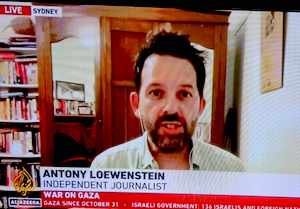
Also interviewed by Al Jazeera, independent journalist Antony Loewenstein, author of The Palestine Laboratory exposing the Israeli military profit machine, talked about the views of the Israeli population and the Jewish diaspora.
Answering a question about Prime Minister Benjamin Netanyahu’s declared goal of “total victory” as the war drags on, Loewenstein acknowledged how global diasporas were split in their opinions with younger Jewish groups in the US increasingly seeking a ceasefire, but his view of Israel was grim.
“One of the things that is really clear. . . is that most Israelis want their hostages back, which makes sense. But at the same time they are also very happy to keep the war going.
“In fact, most polls do not suggest that the majority of Israeli Jews want the war to end.,” he said.
“They do want Hamas to be removed in some way. What that looks like, of course is up to debate.”
Author Antony Loewenstein discusses Jewish diaspora splits over the Gaza war. Video: Al Jazeera
This post was originally published on Asia Pacific Report.
New Zealand would likely continue funding the United Nations agency delivering aid in Palestine if concerns about its staff were dealt with, the Foreign Affairs Minister says.
Prime Minister Christopher Luxon on Tuesday confirmed New Zealand was reviewing future payments to the UN Relief and Works Agency for Palestine Refugees (UNRWA).
It follows accusations by Israel that 12 agency staff were involved in the Hamas’ attacks on October 7, which left about 1140 dead and about 250 taken as hostages.
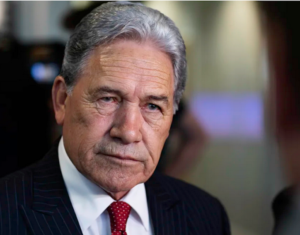
Foreign Affairs Minister Winston Peters told RNZ Morning Report the allegations warranted a proper investigation.
But he said the critical issue was the humanitarian crisis in Gaza.
According to the Palestine Health Ministry more than 26,000 people have been killed in Gaza since Israel launched a war on the besieged enclave in response to October 7.
Awaiting UN investigation
Peters said it was possible there were a few “rotten apples” within UNRWA.
“If the matter has been dealt with, and with assurances that it does not happen in the future, then the crisis is of a level, we must, I believe, and I think the New Zealand people would want us to respond to the crisis rather than to react in that way and punish a whole lot of innocent people because of the actions of a few.” he said.
Peters said it would be premature to make a decision before the UN finished its investigation.
This article is republished under a community partnership agreement with RNZ.
This post was originally published on Asia Pacific Report.
In war, people die for absurd reasons or often no reason at all. They die due to accidents of birth, the misfortune of being born in the wrong place — Cambodia or Gaza, Afghanistan or Ukraine — at the wrong time. They die due to happenstance, choosing to shelter indoors when they should have taken cover outside or because they ventured out into a hell-storm of destruction when they should have…
This post was originally published on Latest – Truthout.
Former New Zealand prime minister Helen Clark, who led the UN Development Programme which oversees UNRWA, told RNZ Morning Report today it was the biggest platform for getting humanitarian aid into Gaza for a populations that is 85 percent displaced.
People are on the verge on starvation and going without medical supplies, she said.
“If you’re going to defund and destroy this platform, then the misery and suffering of the people under bombardment can only increase and you can only have more deaths.”

Clark said it was “most regrettable that countries have acted in this precipitous way to defund the organisation on the basis of allegations”.
Al Jazeera reports that top Palestinian officials and Hamas have criticised the decision by nearly a dozen Western countries led by the US to suspend funding (totalling more than US$667 million) for UNRWA — the UN relief agency for Palestinians — and called for an immediate reversal of the move, which entails “great” risk.
Ireland, Norway and Spain and others (with funding totalling more than $497 million) have confirmed continued support for UNRWA, saying the agency does crucial work to help Palestinians displaced and in desperate need of assistance in Gaza.
The Norwegian aid agency said the people of Gaza would “starve in the streets” without UNRWA humanitarian assistance.
Hamas’ media office said in a post on Telegram: “We ask the UN and the international organisations to not cave into the threats and blackmail” from Israel.
Defunding ‘not right decision’
Former PM Clark did not deny the allegations made were serious, but said defunding the agency without knowing the outcome of the investigation was not the right decision, RNZ reports.
“I led an organisation that had tens of thousands of people on contracts at any one time. Could I say, hand on heart, people never did anything wrong? No I couldn’t. But what I could say was that any allegations would be fully investigated and results made publicly known,” she said.
UNRWA funding cuts — why Israel is trying to destroy the UN Palestinian aid agency. Video: Al Jazeera
“That’s exactly what the head of UNRWA has said, it’s what the Secretary-General’s saying, that process is underway, but this is not a time to be just cutting off the funding because a small minority of UNRWA staff face allegations.”
Luxon suggested Clark’s plea would not affect New Zealand’s response.
“I appreciate that, but we’re the government, and they’re serious allegations, they need to be understood and investigated and when the foreign minister [Winston Peters] says that he’s done that and he’s happy for us to contribute and continue to contribute, we’ll do that.”
He compared the funding of about $1 million each year (in June) with the $10 million in humanitarian assistance provided by the government for the relief effort — “and we’ve split that money between the International Red Cross and also the World Food Programme”.
Clark said people could starve to death or die because they did not receive the medication they needed in the meantime.
Halting aid to Gaza via UNRWA is “deeply twisted and harmful”.
…And Australia has joined in the halt. https://t.co/17gV0AyPaj pic.twitter.com/5b7DU6dOaB— Peter Cronau (@PeterCronau) January 30, 2024
If major donor countries like the United States and Germany continued to withhold funding, UNRWA would go down and there was no alternative, she said.
Clark did not believe there was any coincidence in the allegations being made known at the same time as the International Court of Justice’s ruling on the situation in Gaza.
According to the BBC, the court ordered Israel to do everything in its power to refrain from killing and injuring Palestinians and do more to “prevent and punish” public incitement to genocide. Tel Aviv must report back to the court on its actions within a month.
Clark said the timing of the UNRWA allegations was an attempt to deflect the significant rulings made of the court and dismiss them.
“I think it’s fairly obvious what was happening.”
States must reverse cruel decision to withdraw UNRWA funding
https://t.co/JRMfHH9P04— Amnesty International (@amnesty) January 29, 2024
Israel had provided the agency with information alleging a dozen staff were involved in the October 7 attack by Hamas fighters in southern Israel, which left about 1300 dead and about 250 taken as hostages.
More than 26,000 people — mostly women and children — have been killed in Gaza since Israel launched a major military operation in response, according to the enclave’s Health Ministry.
UNRWA was founded in the wake of the creation of the state of Israel in 1948 to provide hundreds of thousands of Palestinian refugees who were forcibly displaced with education, healthcare, social services and jobs. It started operations in 1950.
This article is republished under a community partnership agreement with RNZ.
This post was originally published on Asia Pacific Report.
About 500 protesters marched through the heart of Auckland’s tourist suburb of Devonport today to the Royal New Zealand Navy base, accusing the government of backing genocide in the Middle East.
Demanding a “ceasefire now” in Israel’s genocidal war on Gaza that has killed almost 27,000 Palestinians — mostly women and children — so far, the protesters called on the New Zealand government to scrap its support for the US-led Red Sea maritime security operation against Yemen’s Houthis.
Speakers contrasted New Zealand’s “proud independent foreign policy” and nuclear-free years under former Labour prime ministers Norman Kirk and David Lange with the “gutless” approach of current Prime Minister Christopher Luxon.
Among many placards condemning the New Zealand government’s stance, one read: “We need a leader not a follower — grow some balls Luxon”. Others declared “It is shameful for NZ troops to aid genocide”, “Hands off Yemen” and “Blood on your hands”.
Led by the foreign affairs activist group Te Kūaka NZA and Palestinian Youth Aotearoa, the march was organised in reaction to Luxon’s announcement last week that New Zealand would deploy six NZ Defence Force officers to the Middle East in support of the US-led attacks on Yemen.
“We are appalled our government is dragging New Zealand into a new war in the Middle East instead of supporting diplomatic efforts to achieve a ceasefire in Gaza,” Te Kūaka spokesperson Dr Arama Rata said.
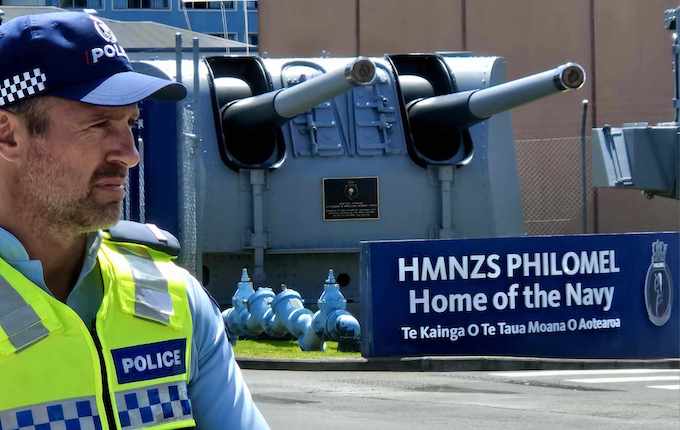
‘Unpopular, dangerous move’
“This is an unpopular, undemocratic, and dangerous move, taken without a parliamentary mandate, or authorisation from the United Nations Security Council, which could further inflame regional tensions.”
Palestine Solidarity Network Aotearoa (PSNA) secretary Neil Scott branded the New Zealand stance as preferring “trade over humanity!”

He said that in South Africa’s case before the International Court of Justice (ICJ) the ruling indicated “plausible genocide” by Israel in its war on Gaza and that state was now on trial with an order to comply with six emergency measures and report back to The Hague within one month.
“This is something that has been obvious to all of us for months based on Israel’s actions on the ground in Gaza and Israeli politicians’ stated intent,” Scott said.
“Yet [our] government refuses to call for an immediate humanitarian ceasefire. It refuses to take any action to oppose that genocide.”
Referring to the Houthis (as Ansarallah are known in the West) and their blockade of the Red Sea, Scott said: “Ships and containers heading to Israel — no other ships to be impacted.
“They [Houthis] state that they are carrying out an obligation to oppose genocide under Article 1 of the Genocide Convention. They will end their blockade when Israel ends the genocide.

‘Oppose Israeli genocide’
“This is something every country in the world is meant to do. Oppose Israeli genocide — that includes Aotearoa.
“So what does Prime Minister Luxon, Minister of Foreign Affairs [Winston] Peters and Minister of Defence [Judith] Collins do? They decide to send our sailors to the Red Sea to defend ships — getting our Navy to be complicit in defending Israeli genocide.”
His comments were greeted with loud cries of “Shame”.
Scott declared that the protesters were calling on the government to “acknowledge New Zealand’s obligations” under Article 1 of the Genocide Convention; expel the Israeli ambassador until the genocide ends, and to “immediately rescind the order to send our sailors” to join the US forces “defending Israeli genocide”.
The protesters also called on New Zealand’s Defence Force chief Air Marshal Kevin Short and Navy chief Rear Admiral David Proctor to stand by the legal obligations of the Genocide Convention to oppose Israeli genocide.
Pointing to the HMNZS Philomel base as Navy officers and a police guard looked on, Green Party MP Steve Abel referenced New Zealand’s “proud episode 50 years ago” when the late Prime Minister Norman Kirk dispatched the frigate HMNZS Otago (and later the Canterbury) to Moruroa atoll in 1973 to protest against French nuclear tests.
He also highlighted Prime Minister David Lange’s championing of nuclear-free New Zealand and the nuclear-free Pacific Rarotonga Treaty “a decade later” in the 1980s.
Abel called for a return to the “courageous” independent foreign policies that New Zealanders had fought for in the past.
Today’s Devonport naval base protest followed a series of demonstrations and a social gathering in Cornwall Park over the holiday weekend in the wake of the “first step” success against impunity by South Africa’s legal team at The Hague last Friday. Other solidarity protests have taken place at some 17 locations across New Zealand.
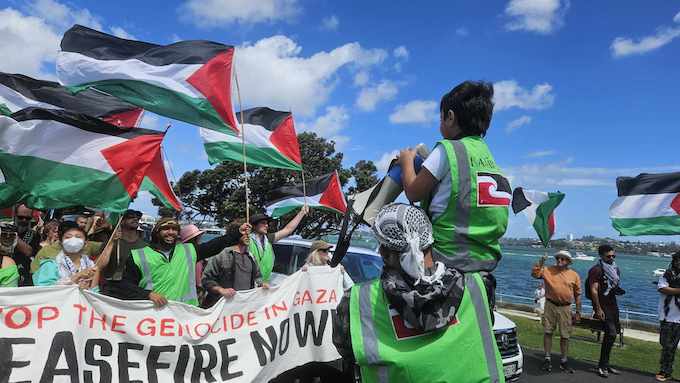
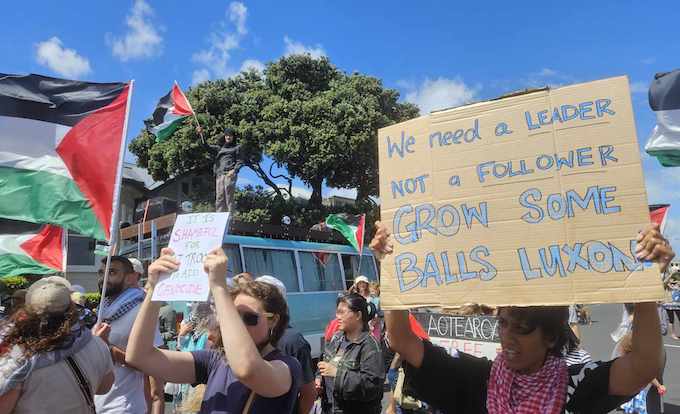
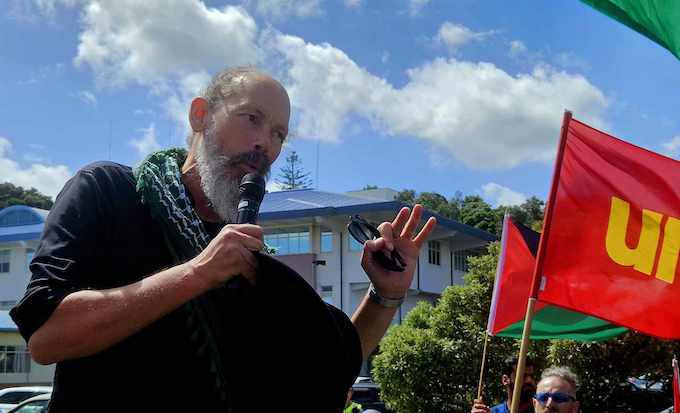
This post was originally published on Asia Pacific Report.
A New Zealander working for the UN refugee agency for Palestinians says having countries pull funding is devastating.
Speaking from Geneva, Hector Sharp told RNZ Midday Report UNRWA was the only organisation with the ability to deliver the kind of aid needed in Gaza.
“We’ve been doing this for 75 years, so we’re quite good at it,” he said.
“In Gaza, we have nearly two million people of the 2.3 million residents completely dependent on UNRWA for their daily shelter, food, and survival.”
Sharp said what was happening now in Gaza was a man-made famine.
“This loss of funding comes at a time where UNRWA is a lifeline for millions of people,” he said.
Sharp said they were urging the countries that had cut funding to reverse those decisions.
He said the allegations of staff from UNRWA being involved in the October 7 attacks came as a shock.
“United Nations employees must remain neutral, independent, and impartial,” he said.
UNRWA is ‘humanitarian’
“UNRWA is a humanitarian agency — we don’t have a police force, we don’t have an intelligence service or a criminal justice capacity, so we have no authority to monitor what our staff do outside their work.
“But, we also don’t work in a vacuum, our staff are drawn from a population which is under ongoing occupation and we are aware of the neutrality risks that this poses,” Sharp said.
New Zealand’s Ministry of Foreign Affairs and Trade said it would review its contribution for the UNRWA, which is under fire after 12 of its staff allegedly took part in the Hamas attack on Israel on October 7.
The ministry said in a statement that this country had been providing UNRWA with $1 million a year in funding.
“As we always do prior to releasing funds, we will assess the situation again prior to that payment being made,” the statement said.
At least nine countries, including top donors the US and Germany, had paused funding after allegations by Israel about 12 staff who had since been dismissed.
This article is republished under a community partnership agreement with RNZ.
This post was originally published on Asia Pacific Report.
A New Zealander working for the UN refugee agency for Palestinians says having countries pull funding is devastating.
Speaking from Geneva, Hector Sharp told RNZ Midday Report UNRWA was the only organisation with the ability to deliver the kind of aid needed in Gaza.
“We’ve been doing this for 75 years, so we’re quite good at it,” he said.
“In Gaza, we have nearly two million people of the 2.3 million residents completely dependent on UNRWA for their daily shelter, food, and survival.”
Sharp said what was happening now in Gaza was a man-made famine.
“This loss of funding comes at a time where UNRWA is a lifeline for millions of people,” he said.
Sharp said they were urging the countries that had cut funding to reverse those decisions.
He said the allegations of staff from UNRWA being involved in the October 7 attacks came as a shock.
“United Nations employees must remain neutral, independent, and impartial,” he said.
UNRWA is ‘humanitarian’
“UNRWA is a humanitarian agency — we don’t have a police force, we don’t have an intelligence service or a criminal justice capacity, so we have no authority to monitor what our staff do outside their work.
“But, we also don’t work in a vacuum, our staff are drawn from a population which is under ongoing occupation and we are aware of the neutrality risks that this poses,” Sharp said.
New Zealand’s Ministry of Foreign Affairs and Trade said it would review its contribution for the UNRWA, which is under fire after 12 of its staff allegedly took part in the Hamas attack on Israel on October 7.
The ministry said in a statement that this country had been providing UNRWA with $1 million a year in funding.
“As we always do prior to releasing funds, we will assess the situation again prior to that payment being made,” the statement said.
At least nine countries, including top donors the US and Germany, had paused funding after allegations by Israel about 12 staff who had since been dismissed.
This article is republished under a community partnership agreement with RNZ.
This post was originally published on Asia Pacific Report.
Agnes Callamard, the secretary general of Amnesty International, has called the funding cuts to the UN’s Palestinian humanitarian relief agency a “heartless decision” by some of the world’s richest countries “to punish the most vulnerable population on earth because of the alleged crimes of 12 people”.
In a post on X, formerly Twitter, she added: “Right after the ICJ [International Court of Justice] ruling finding risk of genocide. Sickening.”
While nine Western nations, including the US, rushed to suspend UNRWA’s funding after allegations that members from the agency participated in the October 7 attack, the same countries have failed to formally revise their ties to Israel despite mounting reports of genocidal abuse by Israeli forces.
Sickening heartless decision of the richest countries in the world to punish the most vulnerable population on earth because of the alleged crimes of 12 people. Right after the ICJ ruling finding risk of genocide. Sickening. https://t.co/ARrPqUdyHA
— Agnes Callamard (@AgnesCallamard) January 28, 2024
The Director-General of the World Health Organisation, Dr Tedros Adhanom Ghebreyesus, said that “cutting off funding” to UNRWA at what he called a “critical moment” would only “hurt the people of Gaza who desperately need support”.
The Palestinian Ministry of Foreign Affairs highlighted the plight of some 1.9 million displaced Palestinians in Gaza with the main UN agency delivering humanitarian aid losing its major financial backing.
“Scenes of forcibly displaced people are a disgrace to humanity,” it said in a statement.
“Over half a million Palestinians in Khan Younis were instructed by the occupying forces to evacuate their homes, including hospitals and health centres, in a cruel expansion and deepening of forced displacement from southern regions.”
UNRWA employs about 30,000 people and provides humanitarian aid, education, health and social services to 5.9 eligible Palestinian refugees living in Gaza, the occupied West Bank, Jordan, Lebanon and Syria.
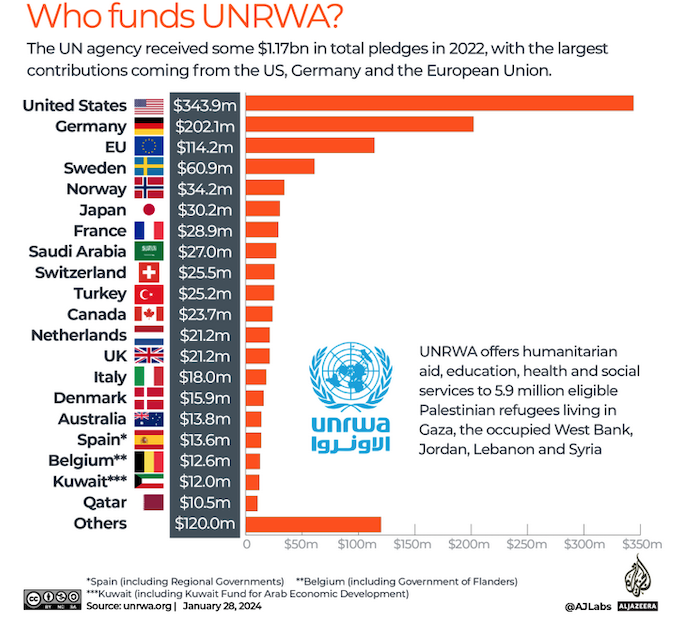
The UN agency received almost US$1.2 billion in pledged in 2020, with the US being the biggest donor providing $343.9 million. The fifth-largest donor, Norway, provided $34.2 million and is continuing is funding in spite of the action by the US and its allies.
Hani Mahmoud, reporting for Al Jazeera from Rafah, southern Gaza, said the entire city of Khan Younis continued to be pounded by Israeli bombardment.
“Thousands of people have been ordered to evacuate and are going through security checkpoints with facial recognition technology,” he said.
“Women and children are separated from the men. A large number of people have been detained and dehumanised during the process.
Video showed people “trying to flee the horror” on different routes away from the bombing they were targeted by tank and artillery shells and small-arms fire, and also Israeli attack drones that hovered low over the city.
There were reports of many people killed.
“Intense fighting is now taking place in the southeastern part of Khan Younis at the edges of Rafah city,” he said.
The documented heart-wrenching scenes of forced #displacement, under the occupation’s aggression, unfold a tragedy for thousands of Palestinian refugees. This includes women, children, the elderly, individuals with special needs, and the sick, forced to flee from central areas of… pic.twitter.com/SkGqRPSqKz
— State of Palestine – MFA
(@pmofa) January 28, 2024
Meanwhile, a “Return to Gaza Conference” in Jerusalem — attended by Israeli cabinet ministers and members of the parliamentary Knesset — has laid out a plan for the re-establishment of 15 Israeli settlements and the addition of six new ones, on where recently destroyed Palestinian communities stood.
An Israeli humanitarian lawyer, Itay Epshtain, said the fact that Israeli officials would convene a high level meeting to plan what he called an act of aggression — the acquisition of occupied territory and its colonisation — was an early indication of intent to breach the provisional measures ordered by the International Court of Justice last Friday.
That #Israeli officials would convene a high level meeting to plan an act of aggression – the acquisition of occupied territory and its colonization – is an early indication of intent to breach the provisional measures order by the @CIJ_ICJ.
— Itay Epshtain (@EpshtainItay) January 28, 2024
This post was originally published on Asia Pacific Report.
By Patrick Decloitre, RNZ Pacific French Pacific desk correspondent
French President Emmanuel Macron has defended his Indo-Pacific vision during the traditional New Year’s good wishes ceremony to the French Armed Forces in Paris.
Macron said tensions in the Indo-Pacific zone were a matter for concern because France was an integral part of the Indo-Pacific — both in the Indian and the Pacific oceans.
He recalled the French version of the Indo-Pacific had been masterminded in 2018 and had since been developed in partnership with such key allies as India, Australia, Japan and the United Arab Emirates.
“But we have also consolidated it and, may I say entrenched it, in our own (overseas) territories,” he said, citing New Caledonia as an example of French army presence to defend France’s sovereignty and “the capacity for our air force to deploy (from mainland France) to Oceania within 48 hours”.
He also praised the recent South Pacific Defence Ministers’ Meeting held in Nouméa last month when “France was the inviting power”.
He said Paris was able to strike “strategic partnerships” with neighbouring armed forces.
“The year 2024 will see us maintain without fail the protection of our overseas territories,” he told the troops.
This article is republished under a community partnership agreement with RNZ.
This post was originally published on Asia Pacific Report.
A civilian employee of the US Army has been arrested for allegedly stealing ONE HUNDRED MILLION dollars from the federal government. The employee was using a shell company to get millions in grants and payments from the government by lying about services the company was performing. Mike Papantonio & Farron Cousins discuss more. Transcript: *This transcript was generated by […]
The post Woman Uses Phony Foundation To Steal $100 Million From U.S. Army appeared first on The Ring of Fire Network.
This post was originally published on The Ring of Fire Network.
COMMENTARY: By Caitlin Johnstone
The International Court of Justice rejected Israel’s request to dismiss the genocide case brought against it by South Africa yesterday, ruling by a massive majority that the case shall proceed and instructing Israel to refrain from killing and harming Palestinians in the interim.
Many Palestine supporters have expressed dismay that the ICJ did not explicitly order a ceasefire, while many others (including South African officials) argue that the ruling is very positive and tantamount to a ceasefire order because it demands the end of harm to members of the protected group.
Imperial media are aggressively emphasising the absence of a ceasefire order in their headlines and many Israel apologists are framing that absence as a victory for their favorite ethnostate.
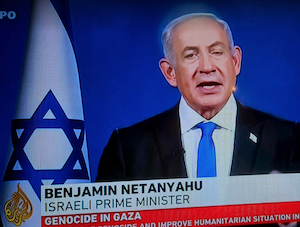
But such performative chest-thumping is severely undercut by the way high-level Israeli officials are currently accusing the ICJ of antisemitism and saying Israel should ignore its rulings.
“The international court of justice went above and beyond when it granted South Africa’s antisemitic request to discuss the claim of genocide in Gaza, and now refuses to reject the petition outright,” complained Israeli defense minister Yoav Gallant in response to the ruling.
Israeli officials accuse international court of justice of antisemitic bias https://t.co/QoUltAdHgG
— The Guardian (@guardian) January 27, 2024
“The decision of the antisemitic court in The Hague proves what was already known: This court does not seek justice, but rather the persecution of Jewish people,” said Israeli national security minister Itamar Ben Gvir.
Ben Gvir also tweeted “Hague Schmague” immediately after the ruling was issued, which will probably go down in history as the most Israeli tweet of all time.
Everyone’s arguing about whether or not the ICJ’s ruling is helpful, and I don’t know enough one way or the other to be sure either way, but from where things stand right now it does seem unlikely to me that managers of the Israeli war machine would be getting this freaked out and whipping out their tired old “antisemitism” song and dance if there wasn’t something of substance to it.
The genocide case against Israel. Video: Al Jazeera
International lawyer Francis Boyle, who won provisional measures against Yugoslavia at the ICJ in 1993, said the following of the ruling:
“This is a massive, overwhelming legal victory for the Republic of South Africa against Israel on behalf of the Palestinians. The UN General Assembly now can suspend Israel from participation in its activities as it did for South Africa and Yugoslavia.
“It can admit Palestine as a full member. And — especially since the International Criminal Court has been a farce — it can establish a tribunal to prosecute the highest level officials of the Israeli government, both civilian and military.”
So take that for whatever that’s worth to you. In any case the butchery in Gaza still urgently needs to be ended, and only time will tell whether Friday’s development had any major effect on the outcome of this horror.
But what I wouldn’t have given to be a fly on the wall at the meetings they were having at the US State Department on Friday.
It’s days like this that remind you why empire managers switched from talking about “international law” to using the meaningless phrase “rules-based international order”.
Caitlin Johnstone is an Australian independent journalist and poet. Her articles include The UN Torture Report On Assange Is An Indictment Of Our Entire Society. She publishes a website and Caitlin’s Newsletter. This article is republished with permission.
This post was originally published on Asia Pacific Report.
ANALYSIS: By Trita Parsi
The International Court of Justice (ICJ) has ruled against Israel and determined that South Africa successfully argued that Israel’s conduct plausibly could constitute genocide. The court has imposed several injunctions against Israel and reminds Israel that its rulings are binding, according to international law.
In its order, the court fell short of South Africa’s request for a ceasefire, but this ruling, however, is overwhelmingly in favour of South Africa’s case and will likely increase international pressure for a ceasefire as a result.
On the question of whether Israel’s war in Gaza is genocide, that will still take more time, but today’s news will have significant political repercussions. Here are a few thoughts.
This is a devastating blow to Israel’s global standing. To put it in context, Israel has worked ferociously for the last two decades to defeat the BDS movement — Boycott, Divestment, and Sanctions — not because it will have a significant economic impact on Israel, but because of how it could delegitimiSe Israel internationally.
However, the ruling of the ICJ that Israel is plausibly engaged in genocide is far more devastating to Israel’s legitimacy than anything BDS could have achieved.
Just as much as Israel’s political system has been increasingly — and publicly — associated with apartheid in the past few years, Israel will now be similarly associated with the charge of genocide.
As a result, those countries that have supported Israel and its military campaign in Gaza, such as the US under President Biden, will be associated with that charge, too.
Significant implications for US
The implications for the United States are significant. First because the court does not have the ability to implement its ruling.
Instead, the matter will go to the UN Security Council, where the Biden administration will once again face the choice of protecting Israel politically by casting a veto, and by that, further isolate the United States, or allowing the Security Council to act and pay a domestic political cost for “not standing by Israel.”
I have deleted my previous posts on the ICJ ruling to ensure accurate representation of their decision.
Having read and listened to expert analysis of the ruling, it remains the case that the New Zealand government, a signatory to the Genocide Convention, now has a clear duty… pic.twitter.com/GOulkTJ4Kv
— Donna Miles دانا مجاب (@UnPressed) January 26, 2024
So far, the Biden administration has refused to say if it will respect ICJ’s decision. Of course, in previous cases in front of the ICJ, such as Myanmar, Ukraine and Syria, the US and Western states stressed that ICJ provisional measures are binding and must be fully implemented.
The double standards of US foreign policy will hit a new low if, in this case, Biden not only argues against the ICJ, but actively acts to prevent and block the implementation of its ruling.
It is perhaps not surprising that senior Biden administration officials have largely ceased using the term “rules-based order” since October 7.
It also raises questions about how Biden’s policy of bear-hugging Israel may have contributed to Israel’s conduct.
Biden could have offered more measured support and pushed back hard against Israeli excesses — and by that, prevented Israel from engaging in actions that could potentially fall under the category of genocide. But he didn’t.
Unconditional support, zero criticism
Instead, Biden offered unconditional support combined with zero public criticism of Israel’s conduct and only limited push-back behind the scenes. A different American approach could have shaped Israel’s war efforts in a manner that arguably would not have been preliminarily ruled by the ICJ as plausibly meeting the standards of genocide.
This shows that America undermines its own interest as well as that of its partners when it offers them blank checks and complete and unquestionable protection. The absence of checks and balances that such protection offers fuels reckless behavior all around.
As such, Biden’s unconditional support may have undermined Israel, in the final analysis.
This ruling may also boost those arguing that all states that are party to the Genocide Convention have a positive obligation to prevent genocide. The Houthis, for instance, have justified their attacks against ships heading to Israeli ports in the Red Sea, citing this positive obligation.
What legal implications will the court’s ruling have as a result on the US and UK’s military action against the Houthis?
The implications for Europe will also be considerable. The US is rather accustomed to and comfortable with setting aside international law and ignoring international institutions. Europe is not.
International law and institutions play a much more central role in European security thinking. The decision will continue to split Europe. But the fact that some key EU states will reject the ICJ’s ruling will profoundly contradict and undermine Europe’s broader security paradigm.
Moderated war conduct
One final point: The mere existence of South Africa’s application to the ICJ appears to have moderated Israel’s war conduct.
Any plans to ethnically cleanse Gaza and send its residents to third countries appear to have been somewhat paused, presumably because of how such actions would boost South Africa’s application.
If so, it shows that the court, in an era where the force of international law is increasingly questioned, has had a greater impact in terms of deterring unlawful Israeli actions than anything the Biden administration has done.
Trita Parsi is the co-founder and executive vice-president of the Quincy Institute for Responsible Statecraft. First published at Responsible Statecraft.
This content originally appeared on Asia Pacific Report and was authored by APR editor.
This post was originally published on Radio Free.